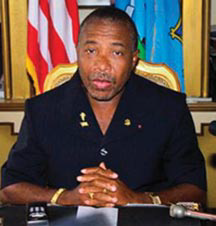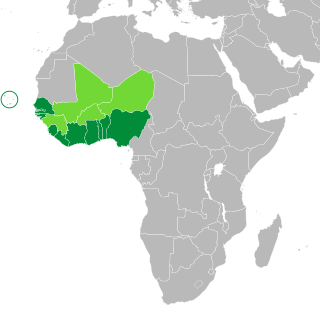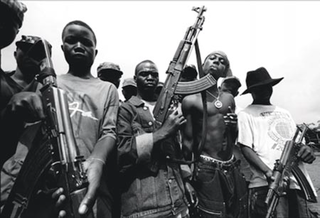Related Research Articles

The Politics of Liberia takes place in a framework of a presidential representative democratic republic modeled on the government of the United States, whereby the President is the head of state and head of government; unlike the United States, however, Liberia is a unitary state as opposed to a federation and has a pluriform multi-party system rather than the two-party system that characterizes US politics. Executive power is exercised by the government. Legislative power is vested in both the government and the two chambers of the legislature.

The Armed Forces of Liberia (AFL) are the armed forces of the Republic of Liberia. Tracing its origins to a militia that was formed by the first black colonists in what is now Liberia, it was founded as the Liberian Frontier Force in 1908, and retitled in 1956. For almost all of its history, the AFL has received considerable materiel and training assistance from the United States. For most of the 1941–89 period, training was largely provided by U.S. advisers, though this assistance has not prevented the same generally low levels of effectiveness common to most of the armed forces in the developing world.

The Nigerian Armed Forces (NAF) are the military forces of Nigeria. The armed forces consists of three service branches: the Nigerian Army, Nigerian Navy, and Nigerian Air Force. The President of Nigeria functions as the commander-in-chief of the armed forces, exercising his constitutional authority through the Ministry of Defence, which is responsible for the management of the military and its personnel. The operational head of the AFN is the Chief of Defence Staff, who is subordinate to the Nigerian Defence Minister. With a force of more than 230,000 active personnel, the Nigerian military is one of the largest uniformed combat services in Africa. According to Global Firepower, the Nigerian Armed Forces are the fourth-most powerful military in Africa, and ranked 35th on its list, internationally.

Charles McArthur Ghankay Taylor is a Liberian former politician and convicted war criminal who served as the 22nd president of Liberia from 2 August 1997 until his resignation on 11 August 2003 as a result of the Second Liberian Civil War and growing international pressure.

Samuel Kanyon Doe was a Liberian politician who served as the 21st president of Liberia from 1986 to 1990. He ruled Liberia as Chairman of the People's Redemption Council (PRC) from 1980 to 1986 and then as president from 1986 to 1990.
Prince Yormie Johnson is a Liberian politician and one of the current Senators from Nimba County. A former rebel leader, Johnson played a prominent role in the First Liberian Civil War. Serving as leader of the Independent National Patriotic Front of Liberia, he captured, tortured and executed President Samuel Doe, who had himself overthrown and murdered the previous president William R. Tolbert Jr.

The First Liberian Civil War was the first in a series of two civil wars within the West African nation of Liberia. It lasted from 1989 to 1997. President Samuel Doe established a regime in 1980 but totalitarianism and corruption led to unpopularity and the withdrawal of support from the United States by the late 1980s. The National Patriotic Front of Liberia (NPFL) led by Charles Taylor invaded Liberia from the Ivory Coast to overthrow Doe in December 1989 and gained control over most of the country within a year. Doe was captured and executed by the Independent National Patriotic Front of Liberia (INPFL), a splinter faction of the NPFL led by Prince Johnson, in September 1990. The NPFL and INPFL fought each other for control of the capital city, Monrovia and against the Armed Forces of Liberia and pro-Doe United Liberation Movement of Liberia for Democracy. Peace negotiations and foreign involvement led to a ceasefire in 1995 but fighting continued until a peace agreement between the main factions occurred in August 1996. Taylor was elected President of Liberia following the 1997 Liberian general election and entered office in August of the same year.

The Economic Community of West African States Monitoring Group (ECOMOG) was a West African multilateral armed force established by the Economic Community of West African States (ECOWAS). ECOMOG was a formal arrangement for separate armies to work together. It was largely supported by personnel and resources of the Nigerian Armed Forces, with sub-battalion strength units contributed by other ECOWAS members — Ghana, Guinea, Sierra Leone, The Gambia, Liberia, Mali, Burkina Faso, Niger, and others.

Lorenzo Thomas was an American officer in the United States Army who was Adjutant General of the Army at the beginning of the American Civil War. After the war, he was appointed temporary Secretary of War by U.S. President Andrew Johnson, precipitating Johnson's impeachment.

The Second Liberian Civil War was a civil war in the West African nation of Liberia that lasted from 1999 to 2003.
The National Patriotic Front of Liberia (NPFL) was a Liberian rebel group that initiated and participated in the First Liberian Civil War from 24 December 1989 – 2 August 1997. The NPFL emerged out of rising ethnic tensions and civil unrest due to the Liberian government that was characterized by totalitarianism, corruption, and favoritism towards ethnic Krahns. The NPFL invaded Liberia through Ivory Coast’s border with Nimba County in Liberia under the direction of Charles Taylor, a former Liberian politician and guerrilla leader who served as the 22nd president of Liberia from 2 August 1997 until his resignation on 11 August 2003.

The United Nations Mission in Liberia (UNMIL) was a United Nations peacekeeping operation established in September 2003 to monitor a ceasefire agreement in Liberia following the resignation of President Charles Taylor and the conclusion of the Second Liberian Civil War (1999–2003). At its peak it consisted of up to 15,000 UN military personnel and 1,115 police officers, along with civilian political advisors and aid workers.
Brigadier John S. Tarnue is a former Liberian military officer. Tarnue was the Commanding General of the Armed Forces of Liberia (AFL) from 1999-2003. Tarnue lost his position in 2003 when Charles Taylor resigned from power.

Ishaya Bakut was Military Governor of Benue State in Nigeria from September 1986 to December 1987 during the military regime of General Ibrahim Babangida. He was Field Commander in Liberia of the ECOMOG West African multinational force from September 1991 to December 1992.

Abdul Aziz One Mohammed was military governor of Borno State, Nigeria, and later was leader of the ECOMOG peacekeeping force in Liberia and Sierra Leone.

Suraj Alao Abdurrahman, was a Nigerian Army general who served as the Command Officer in Charge of the Armed Forces of Liberia, with former Liberian president Ellen Johnson Sirleaf as the Commander-in-Chief. According to then President Johnson Sirleaf, General Abdurrahman "was an exceedingly exceptional gentleman officer whose contributions lifted the Armed Forces of Liberia to professional greatness and emplace our military amongst UN peacekeepers”.

Major General Prince C. Johnson III is a Liberian military officer. As of 2019, he served as Chief of Staff of the Armed Forces of Liberia.

The Chief of Staff is the professional head of the Armed Forces of the Republic of Liberia. The Chief of Staff is appointed by the President of Liberia, who is the commander-in-chief of the Armed Forces according to the Constitution.

The Liberia national transitional government was a provisional government, or rather the name given to three successive governments, in Liberia formed in the midst of the First Liberian Civil War. The LNTG was product of the July 25, 1993, Cotonou Peace Accord, whereby the Interim Government of National Unity disbanded. The respective LNTG-I, LNTG-II and LNTG-III governments were differentiated by being led by three different chairpersons. Initially supposed to last for six months to allow for disarmament of warring factions and preparations of national elections, the LNTG timeline lasted until mid-1997. Various of the warring factions had direct participation in the LNTG and civilian elements were gradually sidelined. Through participation in the provisional governance of LNTG the different warlords could gain access to state resources, even in situations when armed hostilities continued. The LNTG period ended with the 1997 Liberian general election whereby Charles Taylor was elected President of Liberia.
Joseph W. Mulbah (1956–2011) was a Liberian journalist and politician. He served as Minister of Information, Culture and Tourism and Minister of Transport.
References
- ↑ Al Jazeera. Too small to succeed? Liberia’s new army comes of age
- ↑ The Inquirer. AFL Retires Gen. Ziankahn…New Chief Of Staff Says Challenges In Military Will Be Mitigated
- 1 2 Nicholai Hart Lidow (2011). Violent Order: Rebel Organization and Liberia's Civil War. Stanford University. pp. 175, 177. STANFORD:cd347ss0802.
- ↑ West Africa. West Africa Publishing Company Limited. April 2000. p. 21.
- 1 2 Panafrican News Agency (Dakar). Liberia: Taylor Names New Army Chief Of Staff
- ↑ Office for the Coordination of Humanitarian Affairs Integrated Regional Information Network for West Africa. IRIN-WA Update 598